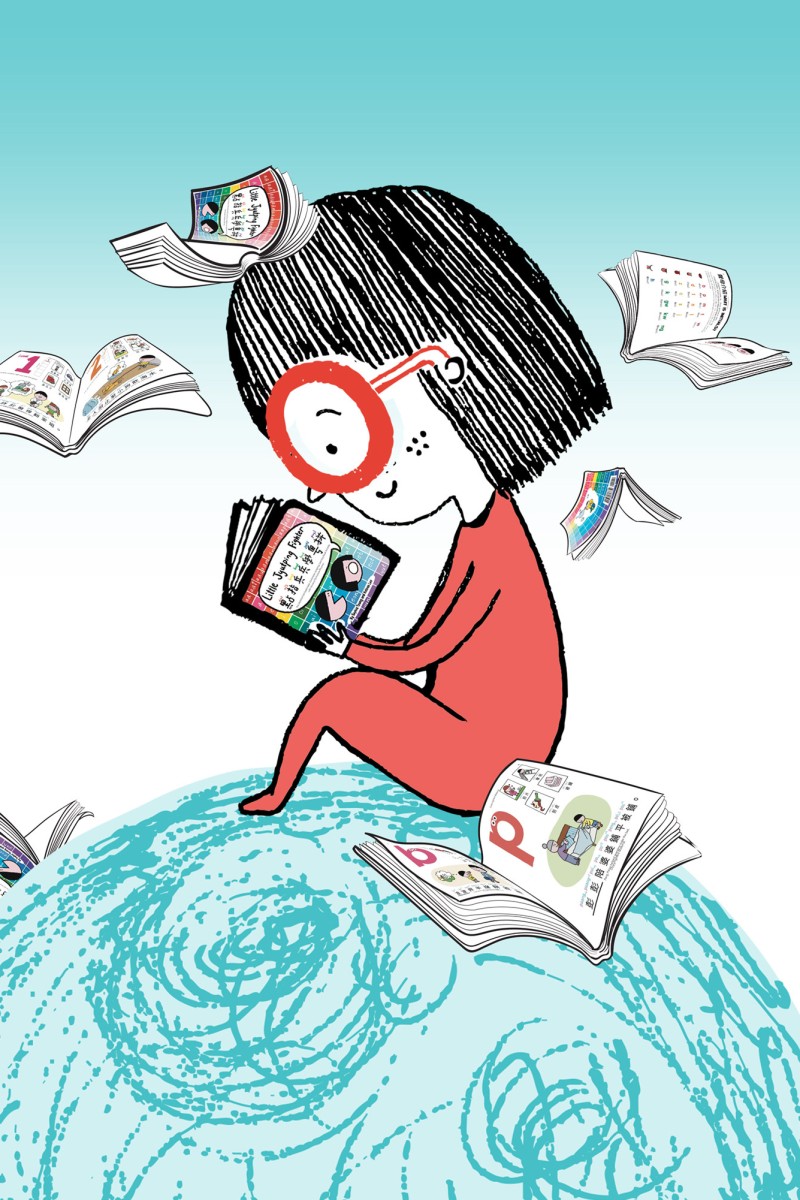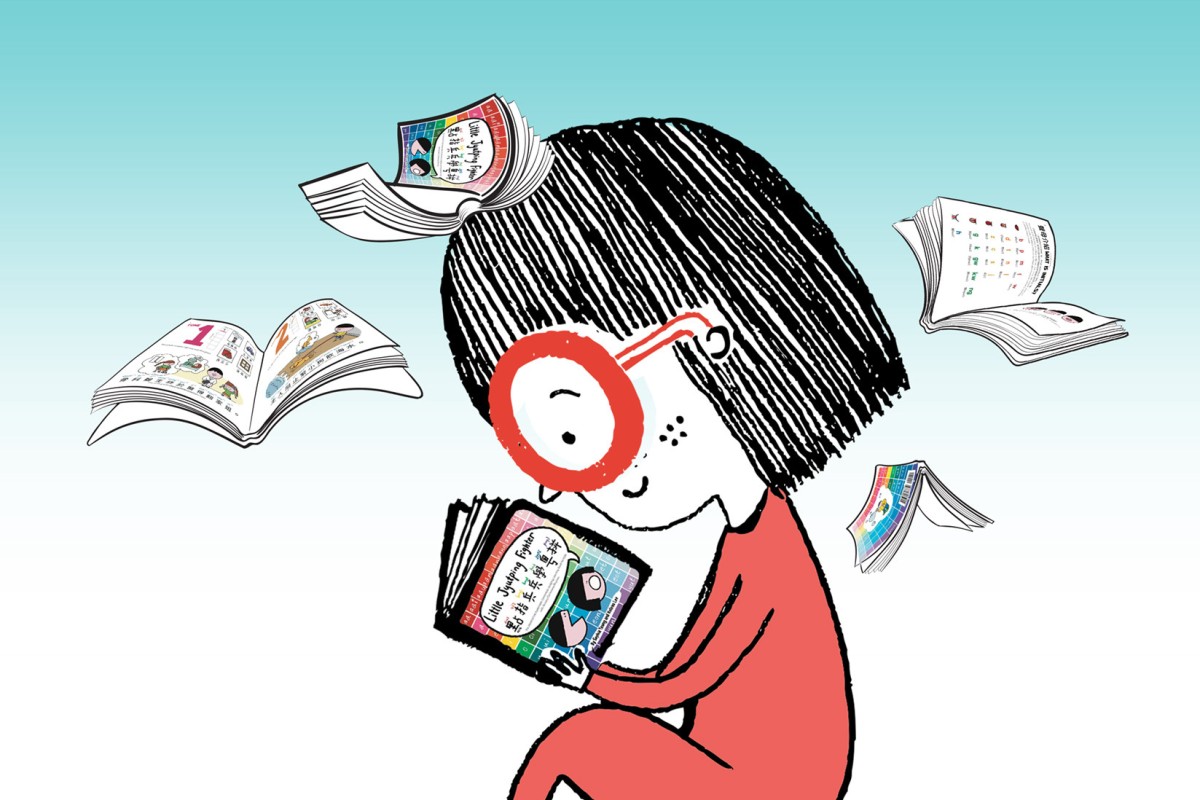
Immigrants from Hong Kong make books and tools to teach Cantonese to their kids
Many of these parents are passionate about promoting their native language to protect their culture and identity.
 Children’s books are helping to preserve the Cantonese language around the world. Illustration: Mario Rivera
Children’s books are helping to preserve the Cantonese language around the world. Illustration: Mario RiveraEight years ago, Sophie Yeung moved from Hong Kong to Melbourne with her two-year-old daughter. But the young parent struggled to find books that taught Cantonese nursery rhymes for bilingual learners.
Yeung decided to make her own book: Little Jyutping Fighter. Released last August, it is one of the first children’s books to teach Cantonese nursery rhymes with Jyutping. Jyutping uses the Roman alphabet to write Cantonese words so it is easier to learn the tones and pronunciation.
“There are many children overseas, or their parents, who aren’t fluent in Cantonese,” the 35-year-old said.
“I thought it would be great to have a book that helps children understand the six tones and the basics of the language.”
Yeung is part of a growing group of mothers from Hong Kong, who are making tools to help children learn Cantonese in English-speaking countries.
Cantonese opera troupe in Hong Kong brings new life to ancient art
Why this book is special
Cantonese is the second most popular language in China, where it is spoken by over 55 million people. It is a special language that has many unique phrases.
But many immigrant children struggle to keep speaking their mother tongue after moving to English-speaking countries.
“In school, they learn new English vocabulary ... But at home, even if parents insist on speaking Cantonese, conversations are often shallow – about what to eat or where to go,” Yeung explained.
“When they want to express more complex ideas ... they switch to English.”
Parents from Hong Kong often struggle to find Cantonese teaching materials for their kids.
That is why Yeung’s book has received so much appreciation. She explained: “Most parents said there’s nothing else like this.”
But for this mother, her book was even more special because her daughter drew the illustrations.
“After I wrote a story, I’d ask her to sketch it in a funny or interesting way,” Yeung said. “She was so happy and proud of her work.”
Cantonese in Ireland
Three years ago, three mothers from Hong Kong started a group: Cantonese in Ireland. They organise activities to promote Cantonese language and culture while helping immigrants settle in Ireland.
“We obviously were worried about our kids [and] the continuity of Cantonese language in their lives,” said 46-year-old Alice Chau Ginguene, one of the group’s co-founders.
The group has hosted about 100 cultural activities, such as Cantonese reading events, film meet-ups and walking tours.
Peg Chiu is another of the group’s co-founders. She is passionate about sharing Hong Kong’s heritage with the next generation. Last March, she released an illustrated Cantonese children’s book, The Tiger Under the Flyover. The story is inspired by “villain hitting”, a ritual to keep bad people away.
“It’s such a rich story – one that reflects the essence of Hong Kong and its people,” Chiu shared.
Why language matters
For many immigrant mothers from Hong Kong, Cantonese represents their identity.
“Cantonese isn’t just about speaking; it’s yum cha, kung fu, Wing Chun, mahjong, and all the traditions that come with it,” Chau said.
“Without your culture, you lose who you are.”
Yeung believes Cantonese is thriving overseas because more immigrants appreciate the importance of the language.
“First-generation immigrants ... realised they lost something and don’t want the same for the next generation. Now, they’re determined to preserve their culture,” Yeung said.
The author described how much changed since she first came to Australia.
“Now ... more [resources are] being created by people working tirelessly to keep the language alive,” she said.
-
Reflect: Do you struggle to learn new languages?
-
Why this story matters: Many immigrants want their children to learn their native language so they can know their culture. Mothers from Hong Kong are finding new ways to pass on their culture, including writing books to teach Cantonese pronunciation.
bilingual 雙語的
able to speak two languages fluently
first-generation immigrants 第一代移民
people who have immigrated to a new country themselves
mother tongue 母語
the language a person learns from birth
nursery rhymes 童謠
short poems or songs for young children, often with repetitive sounds and simple rhythms
settle 定居
to go and live somewhere, especially permanently
shallow 膚淺的
not deep or profound
tirelessly 不知疲倦地
without feeling tired; persistently
Build your vocabulary skills
Who are two first-generation immigrants in this story?
